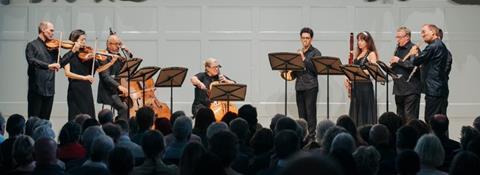David Kettle reports from the Edinburgh International Festival, where eclectic chamber music rubbed shoulders with early works

There was a greater sense of expectation than ever before in the build-up to Edinburgh’s August festivals this year. Not only had there been three long years of pandemic restrictions since the International Festival (and the Fringe, for that matter) had delivered full-scale, full-capacity, indoor events, but both festivals were also celebrating their respective 75th anniversaries.
You might have expected lavish, no-holds-barred celebrations. What emerged, however, was quite a lot of worry and hesitancy, at least on the part of audiences – as demonstrated in the festival’s opening Queen’s Hall chamber concert on 6 August, which was barely half full. Though the rather dour, serious-minded programme from the Philharmonia Chamber Players probably didn’t help. There were EIF connections: the opening 1971 String Trio came from Austrian émigré Hans Gál, himself one of the EIF’s founders in 1947, and Strauss’s Metamorphosen (heard in its string septet version) of course commemorated the wartime destruction that prompted the founding of the festival in the first place.
However, these were strongly characterised, vividly projected accounts that didn’t shy away from the works’ challenges – Gál’s sometimes thorny Schoenbergian motivic writing, and Strauss’s sheer weight of emotion – instead tackling them with shining clarity and transparency. There was an enjoyable balance, too, between the players’ individual musical personalities and corporate identity, especially in the three contrasting approaches from violinist (and Philharmonia leader) Zsolt-Tihamér Visontay, violist Yukiko Ogura and cellist Karen Stephenson in the Gál Trio, so much so that you’d be convinced that this was a long-established chamber group. Those absent listeners didn’t know what they were missing.
There were barely any more in the audience three days later, when the BBC Singers were joined for two unusual items by violinist (and BBC Scottish Symphony Orchestra leader) Laura Samuel. She soared convincingly in the touching, folk-like obbligato fiddle tune that rounds off Latvian composer Ēriks Ešenvalds’s choral Ancient Prairie. Samuel was also the captivating soloist in the perhaps more surprising reimagining of Vaughan Williams’s The Lark Ascending for violin and choir by Paul Drayton. It stayed almost entirely faithful to the string orchestra original, save for the addition of George Meredith’s eponymous poem text to a later sung section; it proved a thoroughly convincing, and very moving, reappraisal of the orchestral warhorse, Samuel’s sinewy, lithe solo line adding a decidedly human dimension to the sometimes otherworldly humming and aah-ing from the voices.
By the time the Pavel Haas Quartet took to the Queen’s Hall stage on 23 August, a packed house suggested that audience confidence had returned. And the foursome delivered a scorching performance, bristling with energy and enthusiasm, though gratifyingly measured in Schubert’s monumental G major Quartet D887, whose restless wavering between major and minor felt less like the composer’s private conflicts between joy and despair, more like mighty collisions between elemental forces. The PHQ players opened with a bold, confident Haydn op.76 no.1, but their account of Martinů’s Seventh Quartet, Concerto da camera, was the concert’s real revelation. It dashed past you with muscular verve and a slightly manic quality, its neo-classical clarity sharply etched, its imitative lines teased apart, and with cellist Peter Jarůšek providing a gloriously rich, passionate, keening solo in the slow movement.
Read: Pavel Haas Quartet at 20: Coming home
Read: Violinist Laura Samuel named leader of BBC Scottish Symphony Orchestra
Review: Sarah Cunningham: Bach
The following day saw a performance by harpsichordist Richard Egarr and friends. Egarr joked that we got pretty much the entire early Baroque Italian and German repertoire for three violins and continuo – quite a narrow, even restrictive focus for a morning’s music, perhaps, but the results were revelatory. There were off-stage echo effects from Biagio Marini, orchestral-scale richness from Giovanni Gabrieli and even a gloriously danceable, light-footed Pachelbel Canon and Gigue, with the three period violinists – Bojan Čičić, Ruiqi Ren and Rachell Ellen Wong – swapping generously between parts and playing with a truly vocal sense of expressivity and suppleness. The sextet of players – with Egarr joined by theorbo player Alex McCartney and gambist Jonathan Rees in an equally supple continuo threesome – breathed and navigated the pieces’ melodic shapes as one, responding effortlessly to the music’s sometimes surprising swerves in direction. It was a concert of seldom heard music (well, mostly), in accounts that brought it to compelling life, and one of the International Festival’s string music highlights for 2022.



































No comments yet